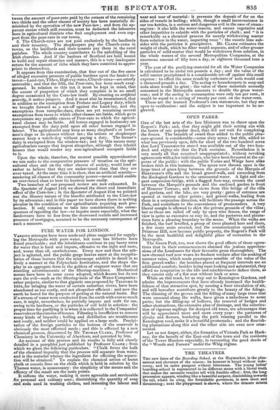PURE WATER FOR LONDON.
Vaaious attempts have been made and plans suggested for supply- ing the Metropolis with pure water, but none has hitherto been found practicable ; and the inhabitants continue to pay heavy rates for water that is hard and impure, offensive to the sight and taste, and, worse than all, unwholesome. Every now and then the sub-
lact is agitated, and the public gorge heaves anew at the recapitu- tion of those horrors that the microscope exhibits in detail in so lively a manner at the Polytechnic Institution, and the shops dis- play in an aggregate form in the goblets of stagnant water that are standing advertisements of the filtering-machines. Mechanical means have been in some cases adopted, which lessen but do not cure the evil—such as the filtering-beds of the Water Companies : other projects, similar to that gigantic one proposed by TELFORD in 1834, for bringing the water of certain suburban rivers, have been abandoned as too costly, and not altogether efficient : and now the earth be bored for the purpose of getting at the natural basin. But if a stream of water were conducted from the earth with ever so much care, it might, nevertheless, be partially impure and unfit for use, owing to its hardness, or the particles of soil held in solution : the proper time for purifying it is when it is collected in the Companies' reservoirs or the cisterns of houses. Filtering is insufficient to remove many kinds of impurity ; boiling and distillation are troublesome and costly, and neither could be applied on a large scale. Precipi- tation of the foreign particles to the bottom of the reservoir is obviously the most effectual mode ; and this is effected by a new chemical process, discovered by Mr. THOMAS CLARK, Professor of Chemistry in the University of Aberdeen, and patented by him.
An account of this process and its results is fully and clearly detailed in a pamphlet just published by Professor CLARK; from which we glean the following particulars. " Chalk forms the bulk of the chemical impurity that the process will separate from water, and is the material whence the ingredient for effecting the separa- tion will be obtained." To explain the chemical action of burnt chalk or caustic lime on the chalk which is held in solution by the Thames water, is unnecessary: the simplicity of the means and the efficacy of the result are the main points.
It softens the water, making it more agreeable and serviceable for personal and culinary uses; diminishing the quantity of soap .and soda used in washing clothes, and lessening the labour and wear and tear of material: it prevents the deposit of far on the sides of vessels in boiling ; which, though a small inconvenience in our tea-kettles, is a serious and dangerous evil in the case of steam- engines : it also kills the water-insects, and causes vegetative and other impurities to subside with the particles of chalk; and " it is remarkable as a chemical process for merely withdrawing matter from solution in the water, imparting none " : the caustic hme sub- sides with the particles it precipitates. Mr. CLARK estimates the weight of chalk, which no filter would separate, and of other grosser particles of solid matter that would be withdrawn from solution, in the whole waters of the several Metropolitan Companies, at the enormous amount of fifty tons a day, or eighteen thousand tons a year.
The cost of the purifying-material for all the Water Companies is calculated to be under ten pounds a day ; and the value of the solid matter precipitated is a considerable set-off against this small expense : to effect the same result by carbonate of soda would cost a thousand pounds a day. The saving to housekeepers in soap and soda alone would be great : the value of these materials annually consumed in the Metropolis amounts to double the gross water- rent ; and if the saving in consumption were only ten per cent., it would be equal to a saving of twenty per cent. on the water-rent.
These are the learned Professor's own statements, but they are open to verification : and the subject is too important to be ne- glected.


























 Previous page
Previous page